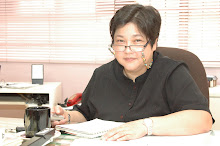I walked on the right side of the main pathway of Seoul's Gyeongbok palace. It is the first palace compound built by the Joseon Dynasty (1392-1910), which established Seoul as its capital.
Normally, when walking though ancient imperial sites, I take a childish delight in taking the emperor's path. No woman would have walked the sovereign's path, unless she was to marry him. In all likelihood she would have walked her way to permanent incarceration inside the palace.
And so with vengeful glee, I would skip down the emperor's path, a gawking and irreverent tourist. I am a woman footloose and free. I have no intention of being incarcerated within any man's palace.
It is almost a cliché to talk of the transient nature of pomp, power and glory. But I still amuse myself with these thoughts when confronted with the monuments of patriarchal power.
In Gyeongbok, the main pathway leading through the gates and courtyards of the imperial palace is divided into three. The central path, slightly raised, was reserved for the emperor. To its left, the path taken by his ministers and other members of the bureaucracy. To its the right, the pathway for the scholars. I am told also that when the emperor sits on his throne, he is slightly oriented to face away from his ministers and towards his scholars.
I am aware of my dislike for feudal patriarchies and yet I am happy to find an ancient tradition that reveres scholars.
I am in Gyeongbok, a day after speaking at a women's studies conference in Duksung Women's University. My task at the conference has been to share how I think we may establish scholarly cooperation in the Asian region.
I started my presentation at the conference by saying that I teach postmodernism by taking a Buddhist framework. I quote the Buddhist monk Thich Nhat Hahn: “Nothing in itself contains an absolute identity. This means a rejection of the principle of identity, which is the basis of formal logic.” And then I quote the feminist postmodernist Judith Butler: “Identity is a culturally constructed principle of order and hierarchy, a regulatory fiction.”
When I teach, I explore the main tenets of postmodernism through Buddhist sayings and practices. It helps even my Christian students grasp the difficult concepts better. Certainly my Asian colleagues who are more steeped in Buddhism, seem even more amused by my approach. Like any nerd, I could just go on about this , but that is not the point of my lecture.
My point is that there is a different set of histories and traditions that mark the Asian academes. The point is that Asian women's studies must begin with the understanding of the power dynamics in global knowledge production. It remains true up to this day, that the questions asked, how the questions are to be answered and who decides what are the good answers, remains a matter of power that skews knowledge production along race, class and gender dimensions.
Women's studies began with such a power analysis. Women studies scholars understand that women's knowledge and experience is often devalued in the academe as well as in society. Women's studies therefore. is about bringing balance to the knowledge of men so that we arrive at human knowledge.
We cannot engage in a dialogue without being aware of the differences in our histories, in our traditions, in our epistemologies and in our relative power positions within different academic settings.
One of my colleagues in Ateneo believes that Western society took a wrong turn when it took on the trappings of enlightenment and modernity. This is an argument for postmodernism, but it is also an argument for Eastern philosophies that lie outside the Western traditions. Thus, I engage both East and West dialogically by teaching postmodernism through the way of the Buddha. And yet I understand that I am making a dangerous proposition, this banging two philosophies around like that.
During the entire conference, a young student from Duksung University is assigned to help me. She picked me up at the airport, waited patiently to escort me to the conference room the following morning, carried my backpack when she could beat me to it, asked about exchange rates and tours, walked me to the restaurant for meals.
Feeling a bit overwhelmed, I asked her whether she did not feel like we were betraying the youth movement. I felt like one of those older activists making the young ones do menial work.
She was aghast. On our way from airport to hotel she had talked about how happy she was to volunteer for the conference. How she had looked me up on the internet and was happy to have been assigned to me. She answered by reminding me of these things and by adding that respect for one's elders was part of her culture even in modern and wealthy South Korea. I felt trapped between the two poles of ageism---was I treating this young person with disrespect and being ageist or was she treating an older person with respect and being non-ageist? Once again I am confronted with another Asian nuance to ponder.
I have come to realize that in the global social movement and the universal academe, we are unable to escape the hegemony of the colonial traditions and neo-colonial ways. Those in the margins need to work double time to recover our own modalities and transform them, while engaging with the mainstream within and outside our social movements.
Thus I walked the scholar's path in Seoul, wondering about the old and the new, thinking about traditions and transformations.
Is an Anti-Choice Clinic Using ‘Unlawful Imprisonment’ as Company Policy?
-
Those familiar with the tactics employed at anti-choice pregnancy clinics
say they're not surprised by a recent Reddit post from a clinic worker.
The po...
7 years ago


No comments:
Post a Comment